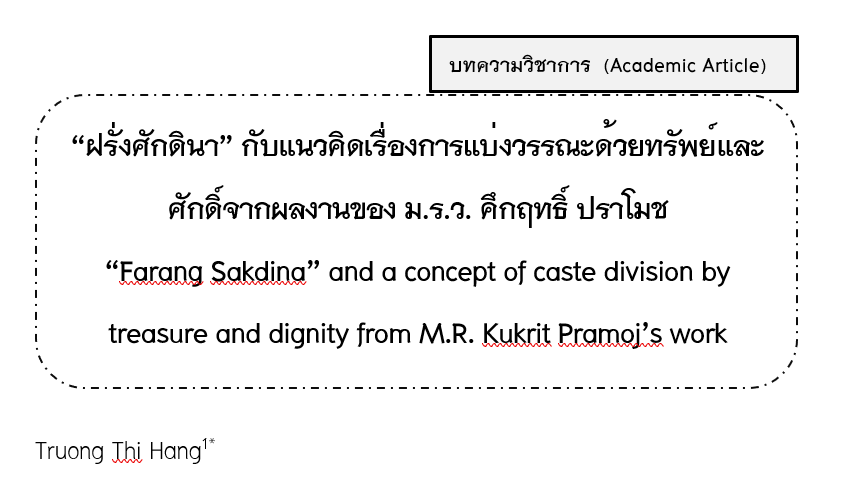“Farang Sakdina” and a Concept of Caste Division by Treasure and Dignity from M.R. Kukrit Pramoj’s Work
Keywords:
“Farang Sakdina”, Caste, Treasure, Dignity, M.R. Kukrit PramojAbstract
This article was sparked by reading a book titled “Farang Sakdina” (Feudal Farang) of M.R. Kukrit Pramoj, which provides knowledge on the history, the origin, including the principles of caste stratification in Western societies under the feudal regime. The roots of feudalism originated in the Roman Empire for the first time and in an era when the government was so weak that it could not provide thorough protection for the people. Although, feudalism was a common convention in the Roman Empire, such as in the territories of today's France and Germany, but it has developed into a complete point in British territory. The main principle is that the whole country's land belongs to the king, and the right of land was used to determine the status and duties of all people. Thailand was ruled by feudalism from the reign of King Borommatrailokkanat of the Ayutthaya period until the reign of King Rama V of the Rattanakosin period. A person's dignity is measured by the number of rai, which is a measure of rice field area. Then feudalism was used as a criterion for determining the rights, duties and status of a person. Reading the work of M.R. Kukrit Pramoj also reveals that the number of cows was used as a measure of honor and influence of a person in the Vedic age’s Aryan society, and Zambian society in South Africa before and after it emerged from British colonialism. However, the division of wealth and dignity in Western societies such as England is different from Eastern societies such as India, Thailand, including Zambian societies in the South African region. For in the Eastern world, "treasures" consisting of tangible objects such as land and cattle, and intangible object such as feudalism. Moreover, "dignity" in the sense of the person's status resulting from such possessions was not always go together. In addition, although Aryan societies in the Vedic age, including Zambia in the South African region, cows were used to assess the status of a person in the same way that Britain and Thailand used feudalism, but it's just the values of the people in one period of time, It is not a fixed rule nor it is established as a law.
References
จิตร ภูมิศักดิ์. (2543). โฉมหน้าศักดินาไทย (พิมพ์ครั้งที่ 8). กรุงเทพฯ: ดอกหญ้า.
โจเซฟ แคมพ์เบลล์ และ บิลล์ มอยเยอร์ส. (2551). พลานุภาพแห่งเทพปกรณัม (บารนี บุญทรง, ผู้แปล) (พิมพ์ครั้งที่ 2). กรุงเทพฯ: อมรินทร์พริ้นติ้งแอนด์พับลิชชิ่ง.
ราชบัณฑิตยสถาน. (2556). พจนานุกรมฉบับราชบัณฑิตยสถาน พ.ศ. 2554 (พิมพ์ครั้งที่ 2). กรุงเทพฯ: นานมีบุ๊คส์พับลิเคชั่นส์.
คึกฤทธิ์ ปราโมช, ม.ร.ว. (2518). จากหน้าห้า น.ส.พ. สยามรัฐ ม.ร.ว. คึกฤทธิ์ ปราโมช ก่อนเป็นนายกรัฐมนตรี. กรุงเทพฯ: ประพันธ์สาส์น.
คึกฤทธิ์ ปราโมช, ม.ร.ว. (2545). สงครามผิว. กรุงเทพฯ: ดอกหญ้า 2000.
คึกฤทธิ์ ปราโมช, ม.ร.ว. (2548). ฝรั่งศักดินา. กรุงเทพฯ: นานมีบุ๊คพับลิเคชั่นส์.
คึกฤทธิ์ ปราโมช, ม.ร.ว. (2552). ไผ่แดง (พิมพ์ครั้งที่ 21). กรุงเทพฯ: ดอกหญ้า 2000.
คึกฤทธิ์ ปราโมช, ม.ร.ว. (2553). สามนคร. กรุงเทพฯ: ดอกหญ้า 2000.
คึกฤทธิ์ ปราโมช, ม.ร.ว. (2556). ธรรมแห่งอริยะ (พิมพ์ครั้งที่ 2). กรุงเทพฯ: ดอกหญ้า 2000.
สุกัญญา สุดบรรทัด. (2554). นักหนังสือพิมพ์ชื่อคึกฤทธิ์. กรุงเทพฯ: ดอกหญ้า 2000.
อำนาจ ยุทธวิวัฒน์. (2517). โต้ ... คึกฤทธิ์ ปราโมช ทุนนิยมคืออะไร?. กรุงเทพฯ: ประชาธรรม.

Downloads
Published
How to Cite
Issue
Section
License
Copyright (c) 2023 Phayao University

This work is licensed under a Creative Commons Attribution-NonCommercial-NoDerivatives 4.0 International License.
ผู้นิพนธ์ต้องรับผิดชอบข้อความในบทนิพนธ์ของตน มหาวิทยาลัยพะเยาไม่จำเป็นต้องเห็นด้วยกับบทความที่ตีพิมพ์เสมอไป ผู้สนใจสามารถคัดลอก และนำไปใช้ได้ แต่จะต้องขออนุมัติเจ้าของ และได้รับการอนุมัติเป็นลายลักษณ์อักษรก่อน พร้อมกับมีการอ้างอิงและกล่าวคำขอบคุณให้ถูกต้องด้วย
The authors are themselves responsible for their contents. Signed articles may not always reflect the opinion of University of Phayao. The articles can be reproduced and reprinted, provided that permission is given by the authors and acknowledgement must be given.







